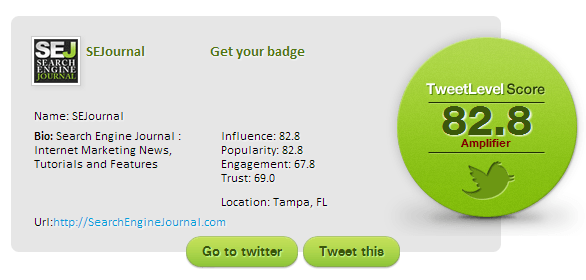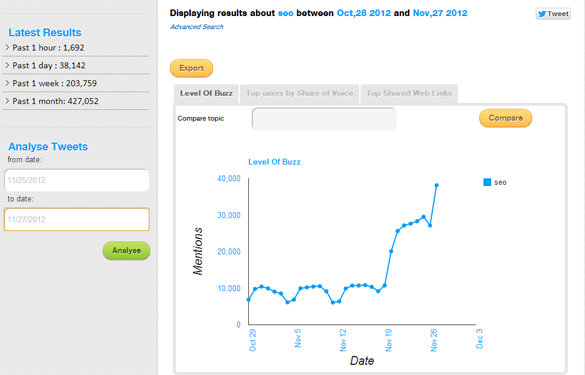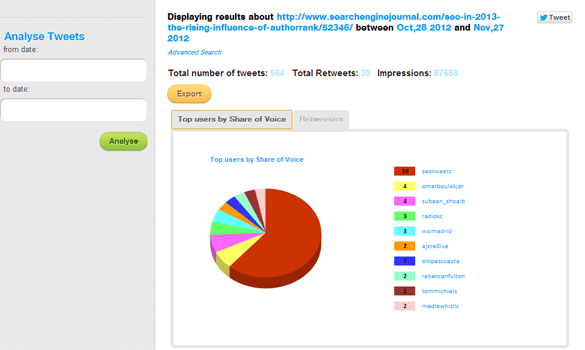For Twitter users with narcissistic tendencies, TweetLevel is, just like Klout, a pat on the back. Because it only analyzes Twitter, TweetLevel may seem a rather “limited” tool too. However, unlike Klout, TweetLevel was designed to offer Twitter intelligence, and that’s something that few other social media analytics tools give you at no cost.

Tweeter Scores
Like many other Twitter influence calculators, TweetLevel shows scores computed based on proprietary algorithms – about forty, in this case. The four scores revealed by TweetLevel go beyond influence, also revealing popularity, engagement and trust.
You can see these scores for any Twitter user, without ever having to give TweetLevel access to your Twitter account, simply by entering someone’s Twitter handle into the Check a TweetLevel field. TweetLevel will take it from there, processing Twitter data, and revealing, in less than 30 seconds, everything you need to know about a certain tweeter. This is not limited to scores. You will also see what type of “influencer” a specific Twitter user is; who are the most influential tweeters retweeting updates by that user; which are the latest tweets; the user’s number of tweets per day; the times of day when the user tweets; and, finally, the most used keywords used by the tweeter, displayed as a word cloud.
In-depth Analytics
This last aspect is very powerful for SEOs and social media marketers. Seeing what an influential Twitter user tweets about is paramount in optimizing content. You can click on any keyword in the word cloud, to get more in-depth reports. But you don’t depend on the word cloud to choose a keyword: TweetLevel allows you to analyze everything from topics and #hashtags, to full URLs.

TweetLevel will reveal results for any given keyword/topic for a time frame of 30 days. But you can refine that search, and analyze only tweets for the time frame of your choice. Or, you can click on “advanced search” to fine-tune results according to other parameters, like language, Twitter user, tag, specific URL and so on.
The data provided by TweetLevel gets more valuable once you find out who are the top 100 most influential Twitter users (by share of voice) talking about a certain topic. To receive a clear ranking of all of them, you will only need to insert your email address, which, according to a TweetLevel disclaimer, will not be kept on file. The email address is necessary as it could take up to six hours for TweetLevel to compute scores for 100 users.
This looks like plenty of data, but what would it mean without the most popular URLs related to the topic you want to analyze? TweetLevel reveals them, and if you want to get data for those too, you are just a click away from even deeper statistics.

Social Metrics Matter for SEO
TweetLevel was created by @jonnybentwood and @alexparish at Edelman, to give PRs a tool to measure influence on Twitter. But this tool is equally valuable for SEO professionals. Knowing what people like to share on social networks is imperative for SEO: content must be optimized for people. You need to keep up with the most popular topics to engage conversations. You need to identify influencers in your niche to get your message across. As Jonny Bentwood, Director and Head of Influencer Engagement at Edelman, told Search Engine Journal:
SEO is not just about amplifying your content through keywords – that is just the basics. Great SEO comes through ensuring that real people spread the value. Social media influencers help spread your information – therefore understanding who they are, and engaging with them appropriately, is a critical success factor.
Years ago, when Twitter launched, some SEOs argued the social network’s “SEO value” looking just at the weight of the links shared on Twitter, and the fact that these were rel=nofollow. But now, the “nofollow” value in Twitter links no longer matters. With Bing upfront about using social media signals in ranking websites in its SERPs, how long before all search engines will admit to look at number of shares to do the same?




![AI Overviews: We Reverse-Engineered Them So You Don't Have To [+ What You Need To Do Next]](https://www.searchenginejournal.com/wp-content/uploads/2025/04/sidebar1x-455.png)